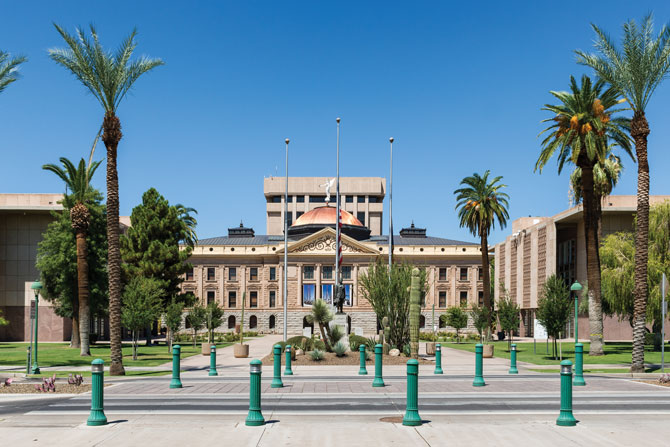The second regular session of the 55th Arizona legislature convened January 10, and legislators are off to a fast start. After two COVID-impacted sessions, there’s a feeling of “back to normal” down at 1700 West Washington. Despite the omicron wave causing a number of positive tests among legislators in the first couple of weeks of the session, both the House and Senate are proceeding at full speed ahead. As of January 31, more than 1500 bills have been introduced — an all-time high. With the state again facing record surpluses and partisan margins still razor-thin, this session promises to be as exciting as the last.
Depending on who you ask, Arizona is going into fiscal year 2023 with either a $3.2 billion or a $4.4 billion surplus. While JLBC, the legislature’s budget arm, is holding a billion dollars in reserve for potential Prop 208 refunds, the governor’s office does not believe Prop 208 revenues have been collected, so no refunds will be owed should Prop 208 be thrown out. While most capitol observers expect Prop 208 to be finally declared unconstitutional, the ruling has not been released as of this writing.
This uncertainty around Prop 208 has influenced the discussions around what is perhaps the biggest issue of the session, education spending reaching the Aggregate Expenditure Limit (AEL).
Passed by the voters over 40 years ago, the AEL limits spending on public education. On April 1, Arizona will exceed the limit, leaving school districts unable to spend appropriated monies and facing a fiscal cliff. While Democrats at the capitol advocate for an immediate legislative remedy, their Republican counterparts are waiting for the Prop 208 ruling to decide how to proceed.
Another significant issue this year is the fate of the last session’s landmark tax cut. Delivering on a campaign promise, Gov. Ducey led the charge to significantly reduce the individual income tax rate. However, angered by what they saw as an attack on the voter-approved tax increase for education, the Red for Ed community has successfully referred the tax cut to the ballot. Due to this, the tax reduction remains on hold until the voters decide in November. With this uncertainty, coupled with the state’s continued revenue bonanza, some key legislators are discussing repealing the tax cut (thus rendering the referral moot) and replacing it with something even more substantial.
Outside of spending issues, a theme of this session so far has been legislation regulating private business activities. As pandemic politics continue to rage, legislators have introduced numerous bills aimed at preventing businesses from instituting vaccine mandates. These range from making employers liable for vaccine-related injuries to requiring businesses to pay substantial severances to noncompliant employees. Other proposals in a similar vein would require financial institutions to provide banking services to the firearm industry. These anti-business proposals face an uphill battle, as the chambers of commerce and other business groups are staunchly opposed, but the populist furor at the legislature is strong.
While Arizona legislative sessions are supposed to run for about 100 days, last year’s session ended on day 171 — the third-longest ever. With many of the same dynamics at play this year, much of the capitol community expects a repeat. But who knows? Perhaps the election later this year motivates legislators to complete their business in a more timely manner.
John Fetherston, Director, Veridus











